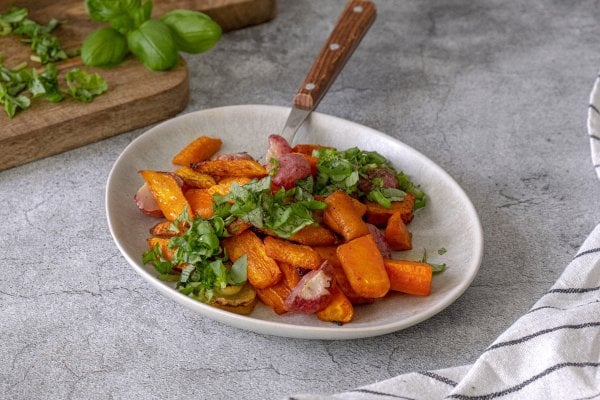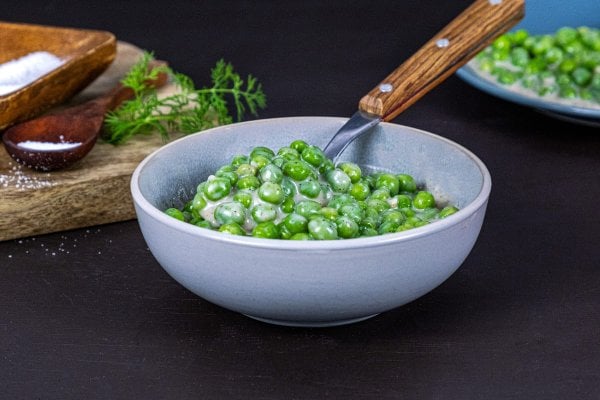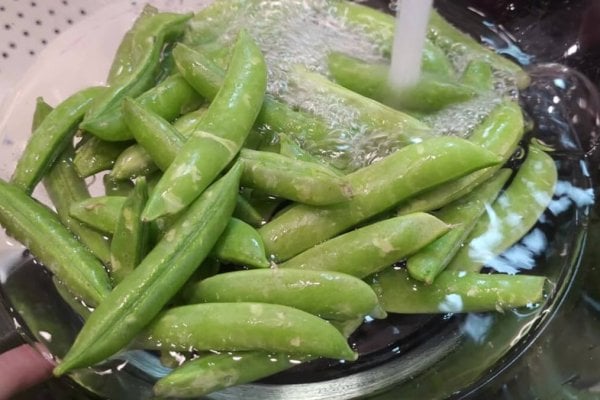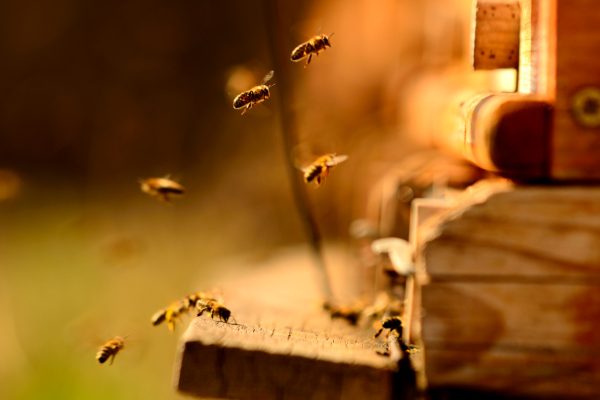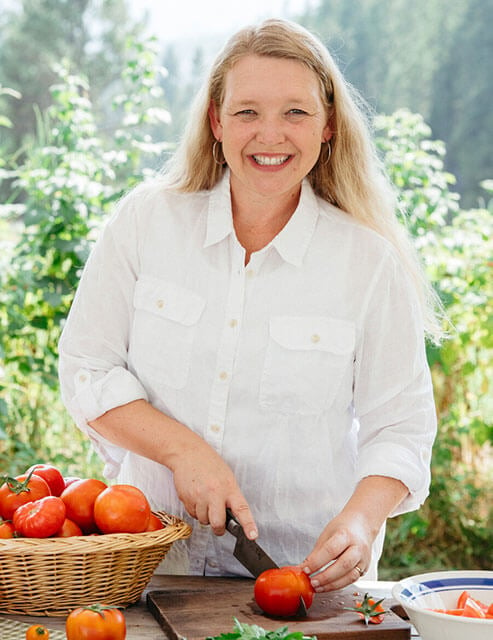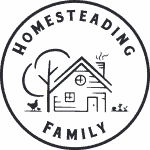Dogs on the homestead are crucial. I think nearly every homestead should have one, but what do we look for when choosing a homestead dog? I’ll break down our must-have criteria in this post.

First of all, this isn’t a post about which breed we think is best. We have a breed we prefer, but it all boils down to your specific needs/criteria. Learning what those needs/criteria are is most important, and then finding a breed that suits those needs should fall into place.

Why We Love Our Homestead Dogs
I’d like you to meet Annie (pictured above), named after Annie Oakley. She’s the newest addition to our homestead and is the daughter of Gus, our other Australian Shepherd (pictured at the top of this post).
We love having homestead dogs for multiple reasons. Not only do we want a friendly companion for our children, but we love knowing there’s extra security around when they’re outside playing or adventuring in the woods.
We’ve discussed managing our livestock, including information about our dairy cows, raising milk goats, shearing sheep, choosing the best homestead animals, our decision to raise and breed kune kune pigs, and even raising rabbits for meat, but we haven’t discussed much about our dogs!
Though we’ve shared photos of them quite a bit in the past, we never discussed our decision-making process when it came time to bring in a new addition.
Luke, our German Shepherd (pictured below), passed away, so it was time to bring another dog onto the Riverbend property.
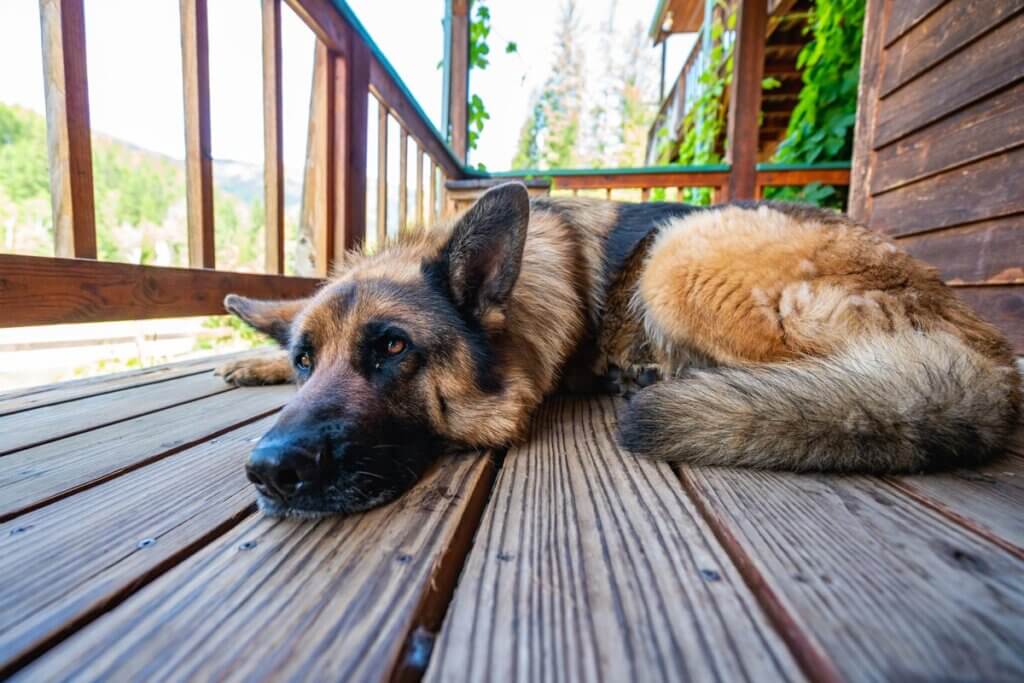
Criteria For Choosing a Homestead Dog
Identify Your Needs
For the past 30 years, we’ve always used the same criteria when choosing a new dog for our homestead. This time was no exception.
When people ask about our dogs, I always share that the breed isn’t the first consideration we make. The first step is to think about what you need and how a dog will fulfill those needs. In other words, what will be the dog’s purpose?
For us, we need a dog who will guard our homestead as well as be a good companion for the family. We want it to let us know if someone comes onto the property that doesn’t belong. Also, to let us know about activity that shouldn’t be happening, such as an animal getting out or a predator on the property.
Because of these needs, we have chosen not to go with the typical Livestock Guardian Dogs (LGDs). Not that they’re bad dogs, but they don’t fit our needs. Typically, LGDs stay out with the livestock all night rather than coming into the home to protect the family.
Since a family companion/guard dog is one of our biggest needs, this made us lean toward a different breed.

Friendly, Yet Assertive
Next on our list is having a dog that’s friendly when it should be friendly yet assertive when there’s a threat. Our dog must be a good companion who’s friendly and a part of the family. As you can see from the photo above, our puppy is already great with our children!
I’ll go into more detail about how to choose a puppy with this trait below.

Good With Livestock
If you’re raising animals and livestock together, the dogs must get along with those animals. They need to understand when to help the animal out, when to leave it alone, and, ideally, when to alert you if needed.
If you’re raising a flock of chickens, you don’t want to get a dog that’s aggressive toward them. Likewise, when the dog is out in the pasture with the animals, it needs to respect them and their space. We don’t want a dog that aggravates our existing animals; they should all work well together.

Indoor or Outdoor
Next, choose whether you need an indoor or an outdoor dog. It doesn’t have to be one or the other, but you should know whether you’ll want the dog to come inside at all, as that may eliminate certain breeds.
We like to have both an indoor and outdoor dog on our homestead. Though both dogs primarily stay outside during the day, the indoor dog sleeps inside next to our bed at night.
The reason for this is our property is large, and there have been times that our outside dogs have been trying to alert us to something with their barking, but we didn’t hear it while we were fast asleep. The goal of having the inside dog is that she’ll hear this barking and alert us to what’s going on outside.
So, while the outdoor dog protects animals from predators at night, it will also alert the indoor dog if there’s an issue that needs our attention. We like our outdoor dog to be male and intact. The reason for this is that males generally have a bit more assertiveness/aggressiveness. They’ll be more territorial and intent about their space.
Having an intact dog has always worked for us because we are very remote and don’t have to worry about the dog interacting with neighboring female dogs. However, if neighboring dogs might be an issue, you may need to choose to have your dog neutered. This will be dependent on your specific situation.
Having an outdoor male dog has proven very successful for us. When we first moved to this property, we were told by the previous owners that we’d get all kinds of predators. We have many wild animals here in North Idaho (grizzly and black bears, mountain lions, raccoons, elk, deer, moose, etc.), yet with our outdoor dog have had almost no pressure from them on our property since moving here.
Homestead Hack: Cats also play a vital role in protecting our gardens from the smaller pests that dogs generally ignore!

Breed
Our favorite breed is an Australian Shepherd, but we’ve also had German Shepherds. To us, the dog’s temperament is more important than the breed. We consider all the above criteria before even thinking about a specific breed.
By creating a list of must-haves for your dog, you can find the breed that matches your desired character traits and needs.
When choosing a breed, please also consider your climate and environment. If you live in a hot climate with mild winters, you may not want to get a long-haired dog that’s been bred for the frigid winter temperatures. Likewise, you don’t want to choose a short-haired dog that will struggle to stay warm in the winter if you live where it snows.

Find the Right Breeder
When finding a dog breeder, you don’t need to focus so much on papers, registrations or certifications, you want to look for someone who will be breeding animals for their original purpose.
Find a breeder with a setup similar to your ultimate goal (exposed to livestock, children, land, etc.). If you find a breeder who keeps their pups in small kennels, this may set your dog up on the wrong foot.
Furthermore, you want to make sure the breeder is taking good care of their dogs, that the facilities are clean, the animals are healthy and well-fed, and everything looks in order.
The breeders should also be respectful to you, especially if you’re new to having a homestead dog and have a lot of questions. If they don’t give you the respect you deserve or the time you need when making your decision, find someone who will.

Puppy or Older Dog?
There are differing opinions on whether it’s best to get an older dog or a puppy. We always lean toward getting a puppy, as they’re easier to train for your specific needs. Even the most well-trained dog will have to learn new behaviors when moving to a new homestead.
There are also many other complications that can come from getting an older dog. You’ll have the highest degree of success if you start with a puppy.
Tips For Choosing a Puppy
Ideally, you’ll want to visit the breeder a couple of times within the first few weeks of the litter being born. This is so you can identify certain traits in the puppies and find one that’s friendly yet assertive.
We always look for a puppy that approaches you when you arrive, not one that just ignores you or doesn’t seem to care that you’re there.
Aggressive dogs will be obvious. There’s usually a dominant dog in the litter that’s all over the other pups. They may be all over you, jumpy, excited and even a little bit “bitey”. There’s a fine line with aggressiveness. Too much aggression can be problematic, but just enough will make for a great protector.

Don’t Get Hung Up on Perfection!
Always remember, we’re not looking for perfection! It’s very difficult to find a dog that will fit every single one of your criteria. Once you know your criteria, narrow it down to a couple of breed options that tick most of the boxes. From there, start looking for breeders near you where you can visit the facilities, play with the pups and maybe even meet one of the older dogs from the breeding line.
It’s pretty safe to say that no matter where our homestead journey takes us, you’re likely to find us with one, if not two, homestead dogs at all times!

More Posts You May Enjoy
- Rotational Grazing for the Small Homestead
- How Much Land is Needed to Raise a Year’s Worth of Food
- How to Raise a Year’s Worth of Meat
- 7 Reasons Why You Should Homestead This Year
- Our Must-Have Homestead Essentials
- Best Homesteading Books for the Novice or the Pro
- Financial Resiliency on the Homestead











